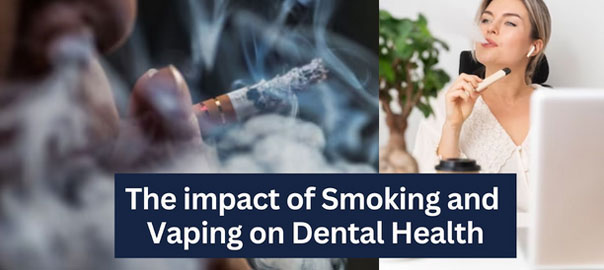
The impact of Smoking and Vaping on Dental Health
Vaping, puffing and blowing may look cool, but they are in truth the worst thing you could have on your pearly whites; from yellowed teeth to nasty sickly breath then loss of teeth, the devastating effects smoking and vaping have on dental health can be so embarrassingly terrible. Regardless of whether you are a heavy smoker or a heavy vaper, it is very important to know how smoking and vaping can affect your teeth and gums. So, put down that cigarette or e-cigarette, take up your toothbrush, and find out how you can protect your smile from these forms of damage.
Smoking and Your Oral Health
Bad effects on dental health: Smoking will adversely affect your dental health. Some of the impacts of smoking on the teeth and gums are as follows:
- Staining: The color of the teeth will be yellow or brown which might not get removed by basic brushing.
- Bad breath: It generally occurs due to smoking as the toxins in the tobacco increase the bacteria present inside the mouth, which causes bad breath and tobacco itself also gives an odor.
- Periodontal disease: Cigarette smoking influences drastically how you may contract gum diseases. Gingivitis can cause inflammation, bleeding of the gums or even loss of teeth.
- Tooth loss: Tobacco use in smoking or vaping increases the chances of losing one or more teeth due to gum disease, tooth decays, and several other complications from the teeth.
- Delayed healing: Delayed healing is a severe concern for smokers, especially after performing a procedure to remove the teeth.
- Oral cancer: Tobacco and the exhales through the mouth has been cited as the most significant risk factor for oral cancer, which forms in the lip; however, its spread goes up to the tongue and throat, etc.
- Dry mouth: Vaping decreases the production of saliva that causes mouth dryness. Saliva is an agent that helps protect the teeth against decay through neutralizing acids produced by bacteria which exist in the mouth. Dryness of the mouth enhances susceptibility towards decay and gum diseases.
- Your enamel layer is affected: vaping harms your enamel layer, and thus your nerves and dentin are exposed. You will experience an intense sensitivity while brushing or when trying to eat hot or cold foods.
Quit smoking and vaping tips
Smoking and vaping can be hard to quit for someone, but quitting is the only way a person can improve their health. Here are some quit smoking and vaping tips for you:
- Set quitting date: You need to set a date when you decide to quit smoking or vaping and stick to that date. You will have a deadline, and a deadline keeps motivating you as well as focusing your thoughts.
- Identify your triggers: This may include responding to specific situations or emotions that cause you to crave smoking or vaping, which in some cases are stress, boredom, or social situations. That you know these will help you devise a strategy that may avoid or manage the trigger.
- Seek help: You are able to quit smoking or vaping if there is somebody you can turn to. This could be friends, family, or even a support group.
- Apply NRT: Smokers can reduce withdrawal and cravings with the help of NRTs. There are four types of NRT: nicotine gum, patches, lozenges, inhalers, and nasal sprays. Discuss which one might be appropriate for you with your dentist.
- Apply behavioral therapy: Behavioral therapy will enable you to discover all the behaviors causing smoking or vaping. Such will include finding new stress-coping mechanisms or engaging in other constructive activities aside from smoking or vaping.
- Be active: Exercise is one good way of minimizing stress and improving your moods. You can pick nearly any exercise that you fancy whether it is a walk, running, or even yoga.
- Avoid alcohol and other triggers: Alcohol tends to reduce inhibitions and thus makes resistance towards smoking or vaping tough. Giving up the other triggers, such as specific foods or activities, will enable you to remain on track.
If quitting is tough, then try to reduce the number of cigarettes each day.
For instance, if you smoke five cigs a day, get it down to one or two a day and then reduce further to zero in subsequent days!!
Smoking and vaping do much more damage than advance harm to oral health and oral aesthetics. Smoking and vaping both stain teeth, promote bad breath, and can initiate dry mouthness. Significantly, however, smoking is the major cause of dental gum disease, leading to loss of the teeth and much greater health problems. Smoking and vaping are both risk factors for oral cancer.
The risk put forward by the alternative may be more cautious than smoking, but vaping can also damage teeth equally. E-cig aerosol irritates gums as well as the throat; this may cause swelling and an infection.
Generally, one should not smoke and vape as much as possible, but instead pay attention to your oral health. Smoking or vaping can be reduced for a higher probability of recovering dental health besides achieving overall well-being.
References:
Leave a Reply
Leave a Reply
Explore More Similar Posts
Explore More Blogs


Leave a Reply